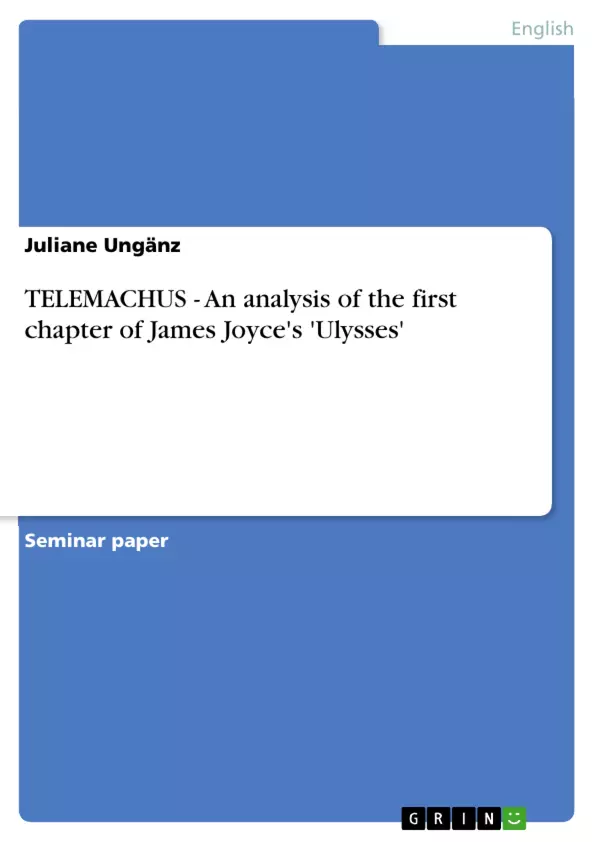At first sight, Ulysses might appear intimidating. The reader’s reaction might vary from confusion to excitement to enthusiasm or even resignation. F. Scott Fitzgerald said the novel made him feel a “hollow, cheerful pain” and remarked: “The book makes me feel appallingly naked.” To Stephan Zweig Ulysses is not just a novel, to him it is a “witches Sabbath of the spirit, a gigantic ‘Capriccio’, a phenomenal cerebral Walpurgisnacht. […] Something evil is its root.” Ulysses is not a novel, it’s an epic.
Inspired by Homer’s adventures of the voyager hero Odysseus Joyce expanded a short story to almost a thousand pages and created a one-of-a-kind portrait of Dublin, at the start of the twentieth century. Hence, Ulysses does not actually mirror the ancient epic, neither does it recall Irish history as presented in a history book, solely in terms of social and political events and changes....
Table of Contents
- Introduction
- Telemachus Plot Summary
- Style of the Narrative
- Central Themes
- Irish Identity
- The old milkwoman - Ireland, a barren wasteland
- Haines - the objectionable colonizer
- Religion - Stephen's self-concept “A servant of two masters”
- Irish Identity
- Interrelations between Joyce and Shakespeare
- The Homeric Parallel
- Conclusion
Objectives and Key Themes
This analysis aims to explore the first chapter of James Joyce's Ulysses, "Telemachus," by examining its allusions, themes, narrative style, and its relationship to the Homeric epic. The objective is to understand how meaning is conveyed and the chapter's function within the larger novel. The analysis considers the chapter's autonomy and its impact on the reader.
- Irish Identity and Colonialism
- Religious and Spiritual Conflicts
- The Role of Art and Artistic Creation
- Literary Allusions and Intertextuality
- The Homeric Parallel and its Significance
Chapter Summaries
1. Introduction: This introductory chapter sets the stage for the analysis by acknowledging the intimidating nature of Ulysses and citing differing critical reactions to the novel. It establishes the author's intention to analyze the first chapter ("Telemachus"), focusing on its allusions, themes, narrative style, and its parallel to Homer's Odyssey. The author aims to demonstrate the chapter's importance as an independent work of art within the larger novel and its effectiveness in capturing the reader's attention and curiosity. The introduction highlights the complexity of Joyce's work, necessitating knowledge of various historical and literary contexts for proper interpretation.
2. Telemachus Plot Summary: This chapter provides a concise summary of the events in Joyce's "Telemachus." It details the morning routine at the Martello Tower, focusing on the interactions between Stephen Dedalus, Buck Mulligan, and Haines. The summary covers Mulligan's mock mass, his teasing of Stephen, the mention of Haines' nightmare, Stephen's memories of his mother, and Mulligan's attempt to persuade Stephen to join forces in creating a new Ireland. The summary highlights the strained relationship between Stephen and Mulligan and the underlying tensions related to Irish identity and colonialism.
Keywords
James Joyce, Ulysses, Telemachus, Irish Identity, Colonialism, Religion, Art, Literary Allusions, Homeric Parallel, Narrative Style, Stephen Dedalus, Dublin.
Frequently Asked Questions: Analysis of James Joyce's "Telemachus"
What is the overall purpose of this analysis?
This analysis delves into the first chapter of James Joyce's Ulysses, "Telemachus," examining its allusions, themes, narrative style, and its connection to Homer's epic. The goal is to understand how meaning is conveyed within the chapter and its function within the larger novel, considering its autonomy and impact on the reader.
What are the key themes explored in the analysis of "Telemachus"?
The analysis explores several key themes, including Irish identity and colonialism, religious and spiritual conflicts, the role of art and artistic creation, literary allusions and intertextuality, and the significance of the Homeric parallel. Specific examples discussed include the portrayal of the old milkwoman representing a barren Ireland, Haines as the objectionable colonizer, and Stephen Dedalus's internal conflict as "a servant of two masters" regarding religion.
What is included in the provided text preview?
The preview offers a comprehensive overview, including a table of contents, objectives and key themes, chapter summaries (covering the introduction and the plot summary of "Telemachus"), and keywords. It acts as a roadmap to the full analysis.
What is the significance of the Homeric parallel in "Telemachus"?
The analysis highlights the significant parallels between Joyce's "Telemachus" and Homer's Odyssey. It explores how Joyce utilizes these parallels to enrich the meaning and understanding of his chapter, adding layers of complexity and significance.
How does the analysis describe the narrative style of "Telemachus"?
While not explicitly detailed in this preview, the analysis promises to examine the narrative style of "Telemachus" as a key element in conveying meaning and contributing to the chapter's overall effect. This is presented as an important factor in understanding the chapter's function within the broader context of Ulysses.
What is the relationship between Stephen Dedalus and Buck Mulligan in "Telemachus"?
The preview highlights the strained relationship between Stephen Dedalus and Buck Mulligan, emphasizing the underlying tensions related to Irish identity and colonialism. Their interactions, as portrayed in the plot summary, are central to understanding the chapter's themes.
What is the role of Irish identity and colonialism in "Telemachus"?
Irish identity and colonialism are central themes. The analysis examines how these themes are presented through characters like the old milkwoman (representing a barren Ireland) and Haines (the objectionable colonizer), illustrating the complexities of Irish identity under colonial rule.
What are the keywords associated with this analysis?
The keywords include: James Joyce, Ulysses, Telemachus, Irish Identity, Colonialism, Religion, Art, Literary Allusions, Homeric Parallel, Narrative Style, Stephen Dedalus, and Dublin. These terms capture the core concepts and subjects explored in the analysis.
- Quote paper
- Juliane Ungänz (Author), 2007, TELEMACHUS - An analysis of the first chapter of James Joyce's 'Ulysses', Munich, GRIN Verlag, https://www.grin.com/document/91631



